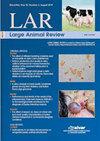Effect of Feed Withdrawal and Progut on Broiler Performance, Carcasses Traits and Blood Parameters
IF 0.3
4区 农林科学
Q4 AGRICULTURE, DAIRY & ANIMAL SCIENCE
引用次数: 0
Abstract
This study evaluated the effect of feed withdrawal without/ with feed additive (Progut®) on broiler chickens’ performance, carcass traits and some blood parameters, in a factorial arrangement (4 feed restriction×2 levels of feed additive). Three hundred twenty-one-day-old broiler chicks (Cobb 500) were distributed into 8 treatments with four replicates. In the first week all chicks fed starter basal diet, however during the second week, broiler chicks were exposed to feed restriction by feed withdrawal time (0, 6, 9, 12 hours/day). Broiler chicks exposed to feed withdrawal had low body weight gain and feed consumption at 2 weeks of age. Feed withdrawal had no effect on final weight, body weight change, total feed intake, total feed conversion, economic efficiency, carcass traits and serum blood composition of 42-day-old-broiler chicks. Feed withdrawal and feed additive in broiler diets decreased total microflora counts and E coil and enhanced lacto Bacillus, amylase and chemo trypsin in broiler guts. Feed additive (Progut®) decreased total feed consumption, improved total feed conversion and increased economic efficiency of broilers. Feed additive increased the level of β globulin and decreased the level of α globulin in serum blood of broiler chicks. The obtained results suggested that feed withdrawal during the second week of age had not effect on broiler performance, carcass traits and serum blood characteristics and improved lacto Bacillus, amylase and chemo trypsin. Feed additive (Progut®) in broiler diets improved growth performance and decreased total bacteria counts, E coli and increased lacto bacillus counts in broiler guts.停饲和原肠对肉仔鸡生产性能、胴体性状和血液参数的影响
本试验采用因子分析法(4种饲料restriction×2添加饲料添加剂水平),评价了不添加/添加饲料添加剂Progut®对肉仔鸡生产性能、胴体性状和部分血液指标的影响。试验选用321只21日龄肉鸡(Cobb 500),分为8个处理,每处理4个重复。第1周全部饲喂基础饲粮,第2周分别按停饲时间(0、6、9、12小时/天)进行限饲。停用饲料处理的肉仔鸡在2周龄时增重和采食量均较低。停饲对42日龄肉鸡末重、体重变化、总采食量、总饲料系数、经济效益、胴体性状和血清血液成分均无影响。饲粮中停用饲料和添加饲料可降低肉仔鸡肠道菌群总数和E圈数,提高肠道乳酸菌、淀粉酶和化学胰蛋白酶水平。饲料添加剂(Progut®)可降低肉鸡总饲料消耗量,提高总饲料转化率,提高经济效益。饲料添加剂提高了肉仔鸡血清中β球蛋白水平,降低了α球蛋白水平。上述结果表明,2周龄停饲对肉鸡生产性能、胴体性状和血清血液特性无显著影响,并能提高乳酸菌、淀粉酶和化学胰蛋白酶的水平。肉仔鸡饲粮中的饲料添加剂(Progut®)提高了肉仔鸡的生长性能,降低了肉仔鸡肠道中的总细菌数量、大肠杆菌数量和乳酸杆菌数量。
本文章由计算机程序翻译,如有差异,请以英文原文为准。
求助全文
约1分钟内获得全文
求助全文
来源期刊

Large Animal Review
AGRICULTURE, DAIRY & ANIMAL SCIENCE-
CiteScore
0.90
自引率
16.70%
发文量
0
审稿时长
>12 weeks
期刊介绍:
Large Animal Review is a bimonthly magazine published by
SIVAR (Italian Society of Farm Animals Veterinary Practitioners) for
scientific updating of veterinarians who deal with animals in livestock production and the supply chain control in the production
of food industry. The topics of main interest for the journal are
those of internal medicine, surgery, obstetrics, animal nutrition,
zootechnics, infectious and parasitic diseases, food safety and security, animal welfare, prevention and management.
 求助内容:
求助内容: 应助结果提醒方式:
应助结果提醒方式:


